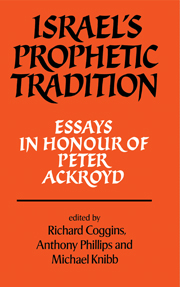Book contents
- Frontmatter
- Contents
- Preface
- Biographical note
- Abbreviations
- Note
- Prophecy in the ancient Near East
- The origins of prophecy in Israel
- Three classical prophets: Amos, Hosea and Micah
- The Isaiah tradition
- An alternative prophetic tradition?
- Visionary experience in Jeremiah
- The Ezekiel tradition: prophecy in a time of crisis
- The prophets of the restoration
- Prophecy and the emergence of the Jewish apocalypses
- Prophecy and wisdom
- Prophecy and the cult
- Prophecy and law
- A change of emphasis in the study of the prophets
- Martin Buber and the interpretation of the prophets
- Index of Biblical References
The Ezekiel tradition: prophecy in a time of crisis
Published online by Cambridge University Press: 09 January 2010
- Frontmatter
- Contents
- Preface
- Biographical note
- Abbreviations
- Note
- Prophecy in the ancient Near East
- The origins of prophecy in Israel
- Three classical prophets: Amos, Hosea and Micah
- The Isaiah tradition
- An alternative prophetic tradition?
- Visionary experience in Jeremiah
- The Ezekiel tradition: prophecy in a time of crisis
- The prophets of the restoration
- Prophecy and the emergence of the Jewish apocalypses
- Prophecy and wisdom
- Prophecy and the cult
- Prophecy and law
- A change of emphasis in the study of the prophets
- Martin Buber and the interpretation of the prophets
- Index of Biblical References
Summary
There exists an inevitable measure of ambivalence in any prophecy, since it requires a certain matching up of what was actually said by a prophet with particular events in which these words could be regarded as fulfilled for a satisfactory interpretation to be achieved. Peter Ackroyd (1962) has drawn attention to the way in which a specific prophetic saying could be developed and reapplied to new situations over a period of time, since it was regarded as a ‘living’ word of God. This essay drew my attention to a facet of Biblical prophecy that has increasingly commanded attention as a key to understanding the peculiar structure of the major prophetic books of the Old Testament. It is clear that in no case are we here presented with a series of prophecies preserved simply as the original prophet received or preached them. Instead, they have passed through a substantial process of editing during which additional material has been introduced to amplify and expand upon the original sayings and records. There is, therefore, a kind of commentary, which is often very complex and difficult to identify because it has become woven into the text of the book itself. In some cases this expansion of an original prophetic collection has continued over a very long period and can be seen to have passed through several stages of quite major reorganisation of the material, besides the incorporation of additions to it. This is most marked in the case of the Book of Isaiah, where different stages in the redactional expansion can still be detected.
- Type
- Chapter
- Information
- Israel's Prophetic TraditionEssays in Honour of Peter R. Ackroyd, pp. 119 - 136Publisher: Cambridge University PressPrint publication year: 1982



